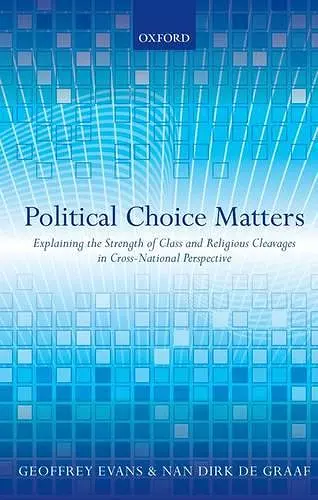Political Choice Matters
Explaining the Strength of Class and Religious Cleavages in Cross-National Perspective
Nan Dirk de Graaf editor Geoffrey Evans editor
Format:Hardback
Publisher:Oxford University Press
Published:28th Mar '13
Currently unavailable, and unfortunately no date known when it will be back

Political Choice Matters investigates the extent to which class and religion influence party choice in contemporary democracies. Rather than the commonly-assumed process in which a weakening of social boundaries leads to declining social divisions in political preferences, this book's primary message is that the supply of choices by parties influences the extent of such divisions: hence, political choice matters. Combining overtime, cross-national data, and multi-level research designs the authors show how policy and programmatic positions adopted by parties provide voters with choice sets that accentuate or diminish the strength of political cleavages. The book gives central place to the positions of political parties on left-right, economically redistributive and morally conservative versus social liberal dimensions. Evidence on these positions is obtained primarily from the Comparative Manifesto Project, with a chapter dedicated to elaborating and validating the various implementations of this uniquely valuable source of evidence on party positions. The primary empirical focus includes case studies of 11 Western, Southern, and Central European societies as well as 'anglo-democracies' including Britain, USA, Canada, and Australia. These detailed analyses of election studies ranging in some cases from the post-war period until the early part of the 21st century are augmented by a pooled cross-national and overtime analysis of 15 Western democracies using a unique, combined dataset of 188 national surveys. The authors show that although there has been some overtime decline in the strength of association between social class and party choice, this is far smaller than the amount of change in the relationship occurring as a result of party movements on questions of inequality and redistribution. The strength of the religiosity cleavage is also influenced by changes in party positions on moral issues - changes that can be understood as a strategic response to a process of secularization that has weakened the electoral viability of parties deriving support from appeals to religious values.
The electoral coalitions assembled by parties of different ideological stripes in todays established Western democracies are not simply a reflection of cross-national or inter-temporal differences in social structure; they also respond to the programmatic appeals of the parties, and more specifically the strategic configuration of programmatic moderation or polarization among them. Drawing on the most comprehensive cross-national and cross-time dataset available to date, and supplemented by a battery of meticulous case studies, this book drives home this crucial point in a more convincing way than any previous study. It is required reading for anyone probing into the realignments of partisan politics in postindustrial democracies and looking for methodological guidance in advancing that enterprise. * Herbert Kitschelt, Duke University *
The question have the effects of social cleavages declined, and if so, how and with what consequences? is fundamental to political sociology, but political scientists and sociologists approach it in different ways and reach different conclusions, often talking past each other in the process. This book bridges the gap by focusing on the values (ideological and social) in the causal chain that links class and religion with party choice. This enables the authors to address both the individual and party aspects of cleavages. Their investigations are conducted in a variety of advanced democracies and on pooled time series data. The result is a powerful synthesis that will be required reading for scholars of both disciplines. * Mark Franklin, MIT *
Issues of social cleavages and their electoral consequences are central to the study of modern democracies. Both theoretically and empirically, this collection is the most important contribution to date to the analysis of these issues. Rival accounts of shifts in cleavage politics in terms of social structural and cultural change or party strategies that determine how far voters can in fact express their class or religious interests, are rigorously formulated and evaluated using both cross-national analyses and national case studies. Quantitative sophistication is combined with sensitivity to institutional and historical specificities. The collection is essential reading for a wide range of social scientists, not to mention party leaders and their advisers. * John Goldthorpe, Nuffield College *
take this book not only as a significant milestone, but also as a springboard to invent new indicators of class and party politics. * European Sociological Review *
ISBN: 9780199663996
Dimensions: 240mm x 162mm x 31mm
Weight: 862g
472 pages